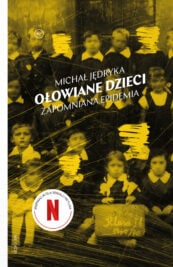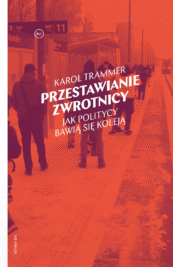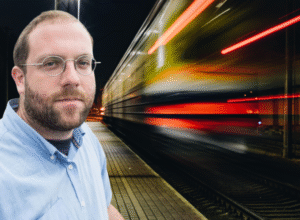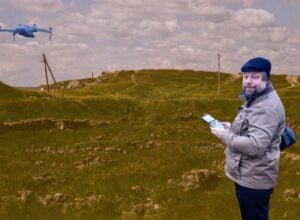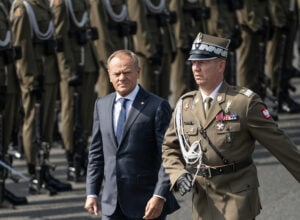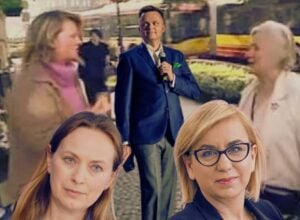Katarzyna Przyborska: W Parlamencie Europejskim odbyła się debata o katastrofalnej powodzi w Polsce, Czechach, Rumunii, Austrii. Głosy były podzielone na: „nie pytajcie, tylko płaćcie jak najszybciej, bo tam czekają ludzie, którzy stracili wszystko” i „zauważmy, że to są konsekwencje braku rzeczywistej polityki klimatycznej”. Jakie jest tutaj pana stanowisko?
Michał Kobosko: Oczekujemy – my, polska delegacja, i my – grupa polityczna Renew Europe, jak najszybszych działań ze strony Komisji Europejskiej i wykorzystania tych funduszy unijnych, które są, do pomocy ofiarom powodzi. A także tego, o co apelowała wczoraj w swoim liście ministra Pełczyńska-Nałęcz, czyli uruchomienia środków unijnych w pierwszej kolejności dla gmin dotkniętych powodzią, również na odbudowę tej infrastruktury, która już została sfinansowana czy współfinansowana ze środków unijnych, a dzisiaj jest zdewastowana.
Z drugiej strony mówimy twardo, że zmiany klimatyczne postępują. Mieliśmy w Polsce gigantyczną, rekordową suszę, z najniższymi historycznymi poziomami m.in. Wisły w Warszawie, a ledwie parę dni później powódź, co pokazuje skalę niebezpieczeństw związanych ze zmianami klimatycznymi. Dziś widać wyraźnie, że opowieści o tym, że należy wyrzucić wszystkie rozwiązania zawarte w Zielonym Ładzie do kosza i odłożyć wyzwania związane ze zmianami klimatu, są bezsensowne i nieodpowiedzialne. A takie opinie były słyszane podczas debaty w Strasburgu nie tylko z ust posła Brauna.
To polska delegacja zainicjowała debatę o powodzi, ale kolejne polityczki i politycy przypominali, że niedawno Portugalię pustoszyły pożary. Pamiętamy katastrofalne pożary na południu Europy w zeszłym roku, tydzień temu powodzie dewastowały Pireneje. Oczywiście warto nad każdą katastrofą pochylić się osobno, ale one wszystkie mają wspólny powód.
Jestem jednoosobową delegacją w grupie liberałów Renew Europe i mogę śmiało powiedzieć, że to ja u nas zainicjowałem tę dyskusję. Cieszę się, że kierownictwo mojej grupy działało bardzo szybko i zdecydowanie. Powstał projekt rezolucji w sprawie skutków powodzi.
Może pan powiedzieć więcej o tej rezolucji?
To dość rozbudowany dokument, który z jednej strony wyraża solidarność i współczucie dla ofiar powodzi, z drugiej wzywa KE do szybkich działań finansowych, a z trzeciej nawołuje do zmiany myślenia i planowania finansowego UE – właśnie w związku ze zmianami klimatu.
Ursula von der Leyen, zaproszona przez Donalda Tuska, zobaczy skutki powodzi w Polsce. Czego pan oczekuje po tej wizycie?
Kryzys związany z powodzią widoczny jest w kilku krajach Europy Środkowej, ale u nas sytuacja wydaje się szczególnie tragiczna, jeśli chodzi o skalę zniszczeń, o liczbę ofiar, liczbę miast, które zostały odcięte od reszty kraju i nie wiadomo, ile czasu potrwa ich odbudowa. Więc bardzo dobrze, że pani przewodnicząca to zobaczy i mam nadzieję, że wpłynie to na szybkość działań Komisji Europejskiej.
Wydaje się to istotne również z poziomu poparcia dla Unii. Rosną w siłę ruchy odśrodkowe, a to jest moment, w którym UE może pokazać rzeczywistą solidarność i udowodnić, że jest nam potrzebna. Katastrofalne susze, powodzie, huragany – to problemy wykraczające poza granice państw.
Tak, zdecydowanie. Mówiłem o tym podczas debaty w parlamencie w Strasburgu. Jestem europosłem w pierwszej kadencji, ale słyszę od kolegów z dłuższym stażem, że tak bardzo i wyraźnie przesuniętego na skrajne prawo – w sensie treści, poglądów, które prezentowane są w debatach – Parlamentu Europejskiego jeszcze nie było. Słychać bardzo wiele głosów skrajnych, szczególnie ze strony nowych ugrupowań w PE, czyli Patriotów dla Europy oraz Europy Suwerennych Ojczyzn. To nacjonalistyczne i antyeuropejskie treści, które mogą dodatkowo osłabiać poczucie przynależności m.in. Polaków do UE. Poczucie, że jesteśmy częścią organizacji, która nas wspiera zarówno na co dzień, jak i – szczególnie – w sytuacjach kryzysowych.
Polska była przeciw Zielonemu Ładowi i Odbudowie Zasobów Przyrodniczych – europejskich projektów kluczowych dla minimalizowania katastrofalnych skutków zmiany klimatu. A teraz potrzebujemy pomocy. Sytuacja jest niezręczna.
Ta sytuacja powinna dać do myślenia politykom z różnych stron sporu politycznego, w tym także przedstawicielom największej partii, która współtworzy naszą Koalicję 15 października.
Mamy taką tendencję w polityce, że jak jest konkretny kryzys, to pada dużo twardych, zdecydowanych słów, a kiedy woda dosłownie i niedosłownie opada, wszyscy zajmują się innymi tematami. To jest ekstremalnie ważna rzecz, bo nic nie wskazuje na to, żeby powodzie czy inne klęski żywiołowe miały nam się zdarzać rzadziej niż do tej pory. Na razie nie jesteśmy w stanie, jak widać, ograniczyć emisji gazów, a nasz kontynent ogrzewa się szybciej od pozostałych. Jeżeli nie chcemy widzieć takich obrazków, jakie widzieliśmy w Kotlinie Kłodzkiej w ostatnich dniach, to trzeba się nad tym problemem pochylić długoterminowo i z należytą powagą, uwzględniając go w budżecie Polski, a także w budżecie Unii Europejskiej na lata po 2027.
Czy wasi koalicjanci z Trzeciej Drogi są tego samego zdania? Mam wrażenie, że nie do końca.
Trudno mi się wypowiedzieć za naszych koalicjantów. Jeszcze się z nimi w Strasburgu nie widziałem. Jak będę miał szansę, to zapytam. Bo mówienie, że nie mamy żadnego wpływu na to, czy takie wydarzenia będą się zdarzały częściej, czy rzadziej, jest nieprawdą. I to my, politycy, jesteśmy odpowiedzialni za to, żeby przygotować się na przeciwdziałanie im. Miewamy różnice zdań, ale myślę, że tak ekstremalne sytuacje powinny wszystkich odpowiedzialnych polityków łączyć ponad podziałami.

 Wspieraj
Wspieraj 

 Wspieraj
Wspieraj  Wydawnictwo
Wydawnictwo 
 Zaloguj się
Zaloguj się 

